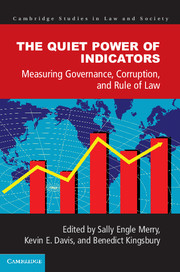Book contents
- Frontmatter
- Contents
- Notes on Contributors
- Acknowledgments
- Introduction: The Local-Global Life of Indicators: Law, Power, and Resistance
- PART I GLOBAL INDICATORS OF GOVERNANCE, CORRUPTION, AND RULE OF LAW
- Part II INDICATORS IN LOCAL CONTEXTS
- 6 Rule of Law Indicators as a Technology of Power in Romania
- 7 Indicators, Global Expertise, and a Local Political Drama: Producing and Deploying Corruption Perception Data in Post-Socialist Albania
- 8 Evaluating the Impact of Corruption Indicators on Governance Discourses in Kenya
- 9 Measuring Labor Market Efficiency: Indicators that Fuel an Ideological War and Undermine Social Concern and Trust in the South African Regulatory Process
- 10 Conclusion: Contesting Global Indicators
- Index
- Books in the Series
- References
9 - Measuring Labor Market Efficiency: Indicators that Fuel an Ideological War and Undermine Social Concern and Trust in the South African Regulatory Process
from Part II - INDICATORS IN LOCAL CONTEXTS
Published online by Cambridge University Press: 05 June 2015
- Frontmatter
- Contents
- Notes on Contributors
- Acknowledgments
- Introduction: The Local-Global Life of Indicators: Law, Power, and Resistance
- PART I GLOBAL INDICATORS OF GOVERNANCE, CORRUPTION, AND RULE OF LAW
- Part II INDICATORS IN LOCAL CONTEXTS
- 6 Rule of Law Indicators as a Technology of Power in Romania
- 7 Indicators, Global Expertise, and a Local Political Drama: Producing and Deploying Corruption Perception Data in Post-Socialist Albania
- 8 Evaluating the Impact of Corruption Indicators on Governance Discourses in Kenya
- 9 Measuring Labor Market Efficiency: Indicators that Fuel an Ideological War and Undermine Social Concern and Trust in the South African Regulatory Process
- 10 Conclusion: Contesting Global Indicators
- Index
- Books in the Series
- References
Summary
[L]aws created to protect workers often hurt them. … More flexible labor regulations boost job creation.
World Bank (2007, 19)The effects of labour law may be more indeterminate than previously thought. … … [T]here is evidence to suggest that the economic effects of labour laws are not just highly varied and complex … but also that they may be efficiency- enhancing in certain contexts …
Deakin and Sarkar (2008, 481)INTRODUCTION
The laws that regulate the labor market – that intangible domain where transactions for labor take place – have not escaped the gaze of indicators. Since the turn of the century a multitude of labor market indicators have been produced within a strained ecology of international organizations concerned with the performance of labor markets. In some cases these organizations are concerned only with one dimension (the “efficiency”) of labor market regulation, notwithstanding the complex multidimensional character of labor law, its origins in social policy, its indeterminate economic effect (Deakin and Sarkar 2008), and indeed notwithstanding its original purpose of injecting equity into an otherwise unequal relationship.
Plotted on a continuum, the international organizations involved in the transnational shaping of the legal norms and institutions that regulate the labor market are poles apart in their mandates and worldviews. These organizations range from a powerful private international organization, funded almost entirely by private enterprise, with an agenda that pushes for labor markets governed primarily by private ordering and market principles to a public international law organization that promotes a coordinated regulatory framework enabling equitable participation in the labor market. This divergence of views among international organizations undermines the development and coherence of legal norms and standards for worker security and creates a fractious transnational legal order that has implications for the domestic debate on labor market regulation.
- Type
- Chapter
- Information
- The Quiet Power of IndicatorsMeasuring Governance, Corruption, and Rule of Law, pp. 284 - 316Publisher: Cambridge University PressPrint publication year: 2015
References
- 1
- Cited by



